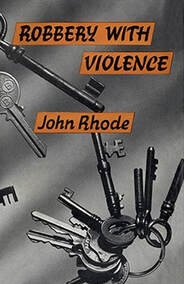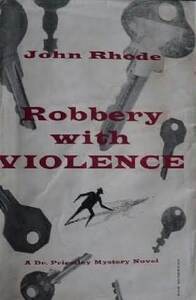
First, the good news. This late-period John Rhode title incorporates an agreeable and rather faultless (from a logical puzzle standpoint) minor mystery. There are no loose ends, and the psychology driving motives and mea culpas, both for the theft and the murder, is straightforward and effective. As with nearly all of the many mysteries produced by Cecil John Charles Street over more than three decades (including his miles of Miles Burton books), Robbery with Violence is an easy and enjoyable read. It is certainly not one of Street’s strongest books, but it has an admirable clarity and cleanness in its plotting and prose.
However, two criticisms can be leveled at this title, and perhaps at much of the author’s 1950s output in general; both elements threaten to reduce the reader’s satisfaction with the story. First, we learn from Curtis Evans in his immersive overview volume Masters of the “Humdrum” Mystery (2012) that, by the late 1940s, Street was narrating the texts of his books into a Dictaphone, which a secretary would then type out. As one can imagine, this verbal approach changes the prose structure, and Robbery with Violence is filled with character monologues that spill on for paragraph after paragraph and page after page. Actual dialogue – a back-and-forth of questions and answers between detective and suspect or witness – is supplanted by a speech where the character inevitably covers all the relevant information with no prompting.
Added to this, the later Rhode/Burton books have a dogged devotion to formula that can make the proceedings feel uninspired. Street was dismissively classified by critic Anthony Boucher as a “Humdrum” detective fiction writer, a craftsman only interested in replicating a story from a genre template (here, a crime, a police investigation, and interviews and clues that lead to a solution) with no greater literary aspirations. It is admittedly difficult not to view the author’s prolific oeuvre as a “cranking out” of books, especially in the later years. Curtis Evans offers this quote from Barzun & Taylor’s A Catalogue of Crime regarding a 1947 Rhode title:
"Rhode now goes about his plots like a contractor; the deliberate laying out of equipment on ground carefully surveyed generates a powerful tediousness."

 RSS Feed
RSS Feed